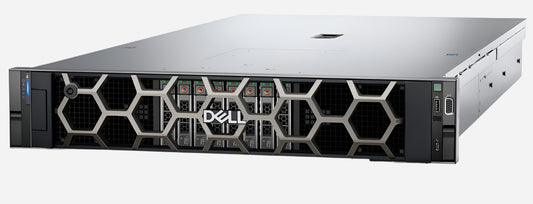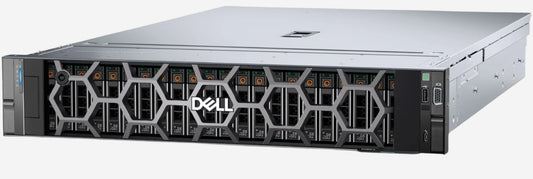
Compare Dell PowerStore storage Overview
OLEKSANDR SYZOVShare
Compare Dell PowerStore storage Overview
Безкоштовна Професійна Консультація з серверного обладнання.
Тел: +38 (067) 819-38-38 / E-mail: server@systemsolutions.com.ua
Конфигуратор Сервера DELL PowerEdge R760
Dell PowerStore is an all-flash, data-centric, intelligent, and adaptable storage platform designed to meet the demands of traditional and modern workloads. It offers a range of models (e.g., 500T, 1200T, 3200T, 5200T, 9200T) with varying specifications to cater to different performance and capacity needs.

Technical Specifications (General Overview)
While specific details vary by model, here's a general breakdown of Dell PowerStore's technical specifications:
Hardware:
- Processors: Multiple Intel CPUs, with varying core counts and clock speeds depending on the model (e.g., 2 Intel CPUs with 24 cores at 2.2 GHz in the 500T; 4 Intel CPUs with 112 cores at 2.2 GHz in the 9200T).
- Memory (RAM): Ranges from 192 GB (PowerStore 500T) to 2560 GB (PowerStore 9200T).
- Storage Media: Primarily uses NVMe SSDs and can also leverage NVMe Storage Class Memory (SCM) for high-performance tiers. NVRAM is used for persistent write caching.
- Connectivity:
- Protocols: Supports Block (FC, NVMe-FC, iSCSI, NVMe/TCP, VMware vVols 2.0) and File (NFSv3, NFSv4, NFSv4.1; CIFS (SMB 1), SMB 2, SMB 3.0, SMB 3.02, and SMB 3.1.1; FTP, SFTP).
- Ports: Various I/O modules supporting 10GbE and 25GbE Ethernet (optical and copper), and 32Gb Fibre Channel.
- Capacity: Scalable raw capacity per appliance, and further scaling with clustering (e.g., 6.16 PBe per appliance for 500T, scaling up to 24.64 PBe per cluster). Logical capacity can reach 8 Exabytes (EB) per appliance.
- Form Factor: Typically 2U chassis, with support for expansion enclosures (SAS-attached).
Software and Features:
- Operating System: PowerStoreOS.
- Management: PowerStore Manager (GUI), PowerStore CLI (PSTCLI) for scripting and automation, REST API. Cloud-based storage analysis with ProSupport.
- Data Services:
- Data Reduction: Inline data reduction (deduplication and compression) with guaranteed 4:1 data reduction ratio.
- Thin Provisioning: Efficient allocation of storage space.
- Dynamic Resiliency Engine (DRE): Advanced data protection with single and double parity.
- Local Protection: Snapshots (immutable and secure), dynamic clones, AppSync Basic.
- Replication: Asynchronous and synchronous replication options, including native metro volume replication for active/active configurations across clusters.
- Security: Data at Rest Encryption (D@RE) with FIPS 140-2 validated Self-Encrypting Drives (SEDs), TLS 1.2 support.
- Virtualization Integration: Deep integration with VMware, including vVols support and the ability to deploy virtual machines directly on the appliance (PowerStore X models) for data-intensive applications.
- Scalability: Supports clustering of up to four PowerStore appliances, enabling scaling of compute, storage, and connectivity while managing from a single control plane. Non-disruptive volume migration across appliances.
Intended Tasks and Use Cases
Dell PowerStore is designed for a wide range of enterprise workloads, focusing on performance, efficiency, and flexibility. Key tasks and use cases include:
- Consolidating Workloads: Its unified architecture supports both block and file storage, allowing organizations to consolidate diverse applications on a single platform, simplifying management and reducing operational costs.
- Mission-Critical Applications: High-performance all-flash and NVMe capabilities make it ideal for demanding applications like:
- Relational Databases: Oracle, SQL Server, SAP.
- ERP Systems: SAP, Oracle E-Business Suite.
- Electronic Medical Record (EMR) applications.
- Big Data analytics.
- Virtualization Environments: Deep integration with VMware and support for vVols make it a strong choice for virtualized infrastructures, offering granular control and simplified management of virtual machines. PowerStore X models allow compute to be localized with storage, beneficial for data-intensive applications and remote/edge deployments.
- Data Protection and Business Continuity:
- Snapshots: Rapid and efficient point-in-time copies for data protection and recovery.
- Replication: Synchronous and asynchronous replication for disaster recovery and continuous availability (e.g., native metro volume replication for zero downtime).
- Immutable and Secure Snapshots: For ransomware protection.
- DevOps and Cloud-Native Applications: Its adaptable infrastructure and support for modern protocols and APIs make it suitable for agile development environments and applications built on containers and microservices.
- Edge Computing and Remote Office/Branch Office (ROBO): The compact form factor and integrated compute capabilities (PowerStore X) can be advantageous for deployments at the edge or in smaller offices where a standalone solution is needed.
- Modernizing IT Infrastructure: PowerStore's data-centric design, intelligent automation, and flexible architecture help organizations move away from legacy storage systems and embrace more efficient and agile IT operations.
- Automating Storage Management: CLI, REST API, and integration with tools like Ansible enable advanced users to script and automate routine storage tasks, improving operational efficiency.
In essence, Dell PowerStore aims to provide a robust, scalable, and intelligent storage foundation for organizations looking to optimize performance, simplify operations, and enhance data protection across their diverse application landscape.
Найкращі ціни на офіційні сервери DELL PowerEdge R760 в Україні.
Безкоштовна консультація по телефону +38 (067) 819 38 38
Доступні моделі серверів зі складу у Києві:
Сервер Dell PowerEdge R760 - Intel Xeon Silver 4510 2.4-4.1Ghz 12 Cores
Сервер Dell PowerEdge R760 - Intel Xeon Silver 4514Y 2.0-3.4Ghz 16 Cores
Сервер Dell PowerEdge R760 - Intel Xeon Gold 6526Y 2.8-3.9Ghz 16 Cores
Сервер Dell PowerEdge R760 - Intel Xeon Gold 5420+ 2.0-4.1Ghz 28 Cores








